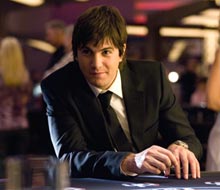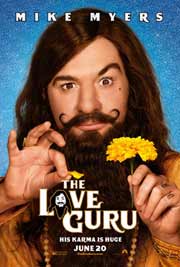 Having recently been on my first trip to Las Vegas, I was amazed by how people got sucked into the lifestyle. I don’t have a lot of money, so of course the idea of turning “not a lot” into “a lot,” was very appealing. But as a student of pop culture and cinema, I knew the basic truths: the odds were against me, and the house always wins. After spending $4 at the quarter slot machines–because if the odds were against me, I might as well not even delude myself into thinking my skill had anything to do with winning or losing–I caved to peer pressure. Because my friends were doing it, I played $10 blackjack: $20 investment, got out when it got to $60. People thought I was lame, but I tripled my money and then walked away. I mean, how many movies and TV shows do I have to see about people losing everything in Vegas, before I “get it”?
Having recently been on my first trip to Las Vegas, I was amazed by how people got sucked into the lifestyle. I don’t have a lot of money, so of course the idea of turning “not a lot” into “a lot,” was very appealing. But as a student of pop culture and cinema, I knew the basic truths: the odds were against me, and the house always wins. After spending $4 at the quarter slot machines–because if the odds were against me, I might as well not even delude myself into thinking my skill had anything to do with winning or losing–I caved to peer pressure. Because my friends were doing it, I played $10 blackjack: $20 investment, got out when it got to $60. People thought I was lame, but I tripled my money and then walked away. I mean, how many movies and TV shows do I have to see about people losing everything in Vegas, before I “get it”?
Vegas is shiny, sparkly, at once the definition of tacky/declasse and the symbol of the American Dream. Where there was desert there is now opulence–this ambiance leads us to believe that anything is possible, that we can transform money troubles into yesterday’s trivia. But film teaches us better: “Leaving Las Vegas.” “Honeymoon in Vegas.” “Indecent Proposal.” “Casino.” “The Godfather 2 & 3.” “The Cooler.” “Swingers.” “Rain Man.” “Showgirls”…and those are just the more contemporary films…we know that the house always wins. (The possible exception: the avowed, yet principled and sexy, criminals of “Ocean’s 11,” 12, and 13–but they were in it primarily for the revenge, the camaraderie, and the challenge of it all–the money wasn’t the central motivator.) And now comes “21,” the movie version of the bestselling book about how a group of MIT students beat the system. All of this Vegasness feeds the fantasy: the little guy can make it big, if he’s smart or figures out the system.
But that’s not the reality. Vegas feeds addictive personalities–people who are inclined to be every gradation of addiction: from shopping and self-pampering (admittedly less destructive behaviors) to those inclined to seek out substances–like alcohol, drugs, sex and money–that have the potential to alter your sense of reality. And that addiction grows in a Petri dish and can lead anywhere from Britney (remember her Vegas wedding?) to “Celebrity Rehab” (people who had it all and still wanted more).
I’m no Bible-thumping teetotaler. I really enjoyed my trip to Vegas, and I’m not fool enough to think that because I tripled my money in an hour of $10 blackjack, that I could invest 10 times that and profit a hundredfold. I enjoy getting away from reality for a few hours. But I always come back to my life. While my friends aren’t alcoholics or drug addicts, I have seen them–otherwise rational people –get sucked in by gambling.
The whole experience left me thinking about the nature of addiction: is it innately born, as in children of alcoholics who have alcoholism in the family? Does it have to do with unhappiness? Is it a competitive spirit, and not a reality-altering one that inspires such a departure? Was the reason I didn’t gamble more because I was too pragmatic? Or was it a rigidity in my character, an inability to believe that the universe owes me something, that held me back from taking a chance? Every time a new Vegas movie comes out, people get a little jazzed by the prospect of feeling involved in it, even for two hours, in the city’s feeling of freedom and infinite possibility that masks the reality–that games of chance are not about control, they’re about letting go and letting gravity take over. And not in the good way.
We know that, and yet, the movies keep coming. What’s your favorite Vegas movie?


